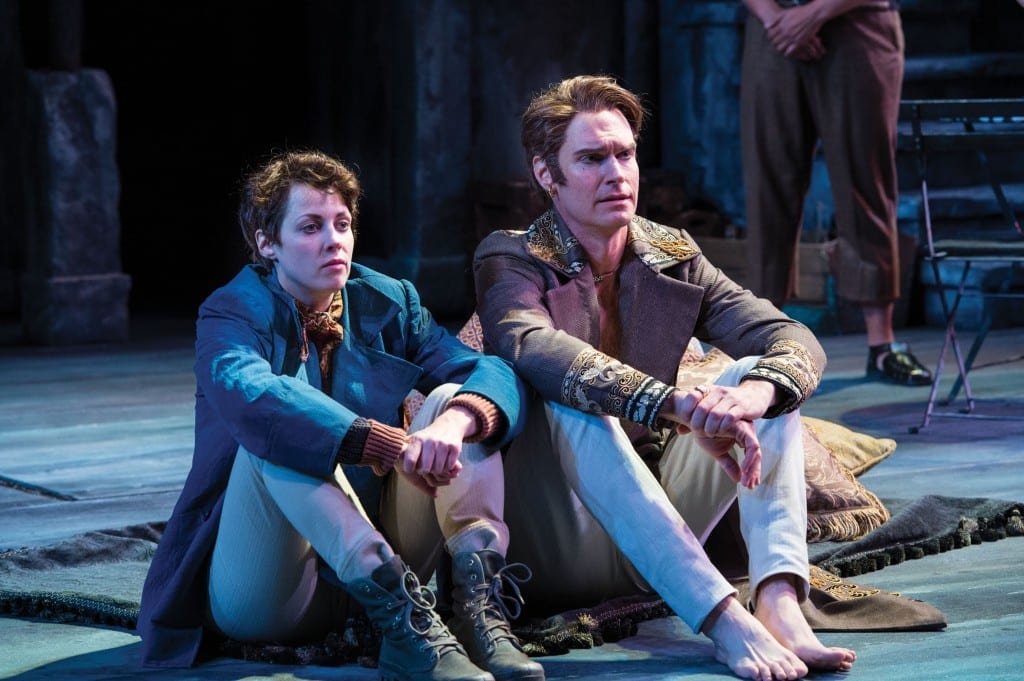CEDAR CITY — “Shakespeare wrote musicals?” I heard on my way to lobby at intermission. “Why yes, yes he did,” I thought cheekily. Modern audiences sometimes forget that Shakespeare’s works were pop culture in his day. While not quite the jukebox musicals of today, it would not be uncommon to mix in a popular tune and bend it to his own means. Still, Utah Shakespeare Festival’s production of Twelfth Night seems to stand out musically compared to other works we’ve seen on their stage. Director David Ivers embraces this unique facet and I, for one, think it works quite well.

It’s another tale of a shipwreck and a pair of twins (’tis the season; the trope appears in The Comedy of Errors plays at the Adams Theatre across the street). Viola seeks refuge in the lovesick Duke Orsino’s entourage disguised as the eunuch Cesario. The little Italian shows her wits as she navigates the waters between her own love for Orsino and his fickle love for Olivia (the lady across the way), who can’t help but enamor herself with the messenger, Cesario/Viola. Couple that with the comic sideplot of Toby, Maria, Andrew and Feste’s plot against the disdainful Malvolio. As all Shakespeare comedies, everyone ends in love and married, only this time there’s a small jig included.
Nell Geisslinger embodies the Viola of Shakespeare’s page. Her voice, her look, and her actions bring life to this heroine. Geisslinger makes Viola both at the mercy of the lovers and yet somehow manages to control the situation using her wits. She reminds me of an adept ship captain handling the the wheel as she winds through the windtossed waves of a storm. I only wish there was a more visible growth to her character. For example, in her first disclosure to the audience regarding her feelings for Duke Orsino (played by Grant Goodman) the words are very clear—she’s in love. But her actions and mannerisms in the previous scene didn’t support this secret at all. I look forward to seeing the character’s thoughts outside of the text. Geisslinger is excellent, though, when she spars with her fellow players.

Melinda Pfundstein is darling as Olivia, the royal love interest across the way that mourns her brother’s recent passing. It’s always a mystery how Olivia shifts from abhorring the Duke’s advances to plotting her own towards Cesario. Pfundstein handles it well. She almost can’t help herself from falling for the youth and that defenselessness adds believability to how readily she accepts the switch from Viola to Sebastian later on. I almost wish though that she and Goodman could find a way to find true love with Sebastian and Viola. But then again, perhaps the love of Sir Toby and Maria are meant to be a better foil for us to follow.
Roderick Peeples (as Toby) and Maryann Towne (as Maria) really are quite brilliant. I have not been a fan of Peeples in past roles, but he is the consummate Sir Toby Belch in this production. I believed every action he takes, and I didn’t feel as though he’s depending on any tricks up his sleeve to keep me entertained. He’s just honest with his character, the action and his fellow players. That is what I love in a good actor. And Towne complements him so well. She makes Maria strong, smart, and just as brash as she needs to be to keep Toby in his place. I could watch these two any day of the week.
Quinn Mattfeld (as Sir Andrew Aguecheek) and Aaron Galligan-Stierle (as Feste, the clown) are brilliant in their own right. Mattfeld seems to breathe an air of Will Forte from Saturday Night Live and Gene Wilder into the loveably simple Andrew. He created a character that seems natural, despite the absurdity of the text. Audiences will revel in his performance, which lives up to his past Festival roles. Galligan-Stierle brings an almost morose sense to Feste the clown. His wits are sharp and biting, but what touched me most is his tenor voice featured throughout the play. As he finishes singing there’s no stopping from thinking, “If music be the food of love, play on.” It’s that poignant.

Once again, director David Ivers has brought a beautiful understanding and unified presentation of Twelfth Night to the stage. The set (designed by Hugh Landwehr) is sullen and melancholy, and the lighting (by Michael Chybowski) turns brighter at the introduction of Viola into this world. The music (composed by Paul James Prendergast) is pointed and meaningful.
Finally, the costumes (designed by Kevin Copenhaver), are simply beautiful, with the unfortunate main exception being the yellow stockings worn by Malvolio. My heart sank when David Pichette (as Malvolio) enters in his yellow stockings and crossed garters. They appeared more like oversized galloshes with electrical tape made worse only by the addition of the matching umbrella. Undoubtedly, fans of the play will have in their mind the perfect entrance here, and perhaps my sentimentality plays a little too harshly here. But I felt an opportunity was lost to play up a bit of the sexual intentions of Malvolio when hiding him in oversized rain gear. Pichette’s performance throughout the play is marvelous and I truly was disgusted by him in the end (to his credit), but this one iconic image didn’t live up to my expectations. Perhaps that is my problem: too many expectations.
This production will make you laugh. You’ll hear beautiful music. Hopefully, you’ll pine a little bit for love. And if you keep your eyes and ears open, you’ll see quite a lot on that stage that echoes back to the roots of Elizabethan theatre. Shakespeare’s having fun in Twelfth Night, and Utah Shakespeare Festival is, too.
[box type=”shadow”]The Utah Shakespeare Festival productoin of Twelfth Night plays various dates at 8 PM through October 17 at the Randall L. Jones Theatre on the campus of Southern Utah University. Tickets are $16-73. For more information, visit www.bard.org.[/box]

